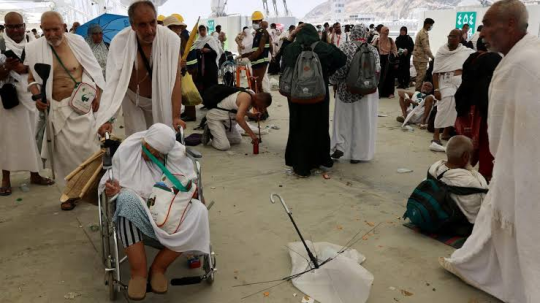
19 Jordanian Pilgrims Died Amid Intense Heatwave in Mecca
By Fiona Nanna, ForeMedia News
3 minutes read. Updated 12:00AM GMT Mon, June 17, 2024
At least 19 Jordanian pilgrims have succumbed to intense heat during this year’s Hajj pilgrimage in Saudi Arabia. Jordan’s foreign ministry reported that these individuals died from sunstroke as temperatures soared above 46°C (114.8°F). An additional 17 Jordanians are currently missing, with searches underway to locate them.
The Iranian Red Crescent has also confirmed the deaths of five Iranian pilgrims, though details regarding the cause remain unspecified.
The Jordanian foreign ministry is collaborating with Saudi authorities to arrange for the burial or repatriation of the deceased, in accordance with their families’ wishes.
Hajj, one of the largest annual mass gatherings globally, sees over 1.8 million participants this year. The pilgrimage, rich in spiritual significance, has often faced severe challenges, primarily due to extreme weather conditions. Despite Saudi efforts to mitigate heat-related issues by setting up climate-controlled areas and distributing water, the severe heat wave has posed significant risks.
Ayman Ghulam, head of the Saudi National Meteorology Centre, had previously cautioned about the heightened temperatures this year, predicting a rise of 1.5 to 2 degrees Celsius above normal in Mecca and Medina, the pilgrimage’s focal points.
The extreme heat has resulted in numerous cases of heat stress, with a treatment center near Mount Arafat reporting 225 instances. The Saudi Press Agency highlighted the government’s ongoing measures, including advising pilgrims to stay hydrated and avoid outdoor activities during peak heat hours.
Neron Khan, a Canadian pilgrim, described the physical and spiritual challenges posed by the heat, recounting her experience with heat exhaustion during the rituals.
The Hajj pilgrimage is set to conclude on Wednesday. Saudi officials continue to emphasize the importance of safety measures and vigilance against the oppressive heat.
This tragedy brings to mind past Hajj calamities, such as the 2015 stampede that claimed over 2,000 lives. The ongoing efforts to improve safety and manage the challenges posed by such large gatherings are crucial to preventing future incidents.
For more updates on the Hajj pilgrimage and other global news, follow our World News section.

